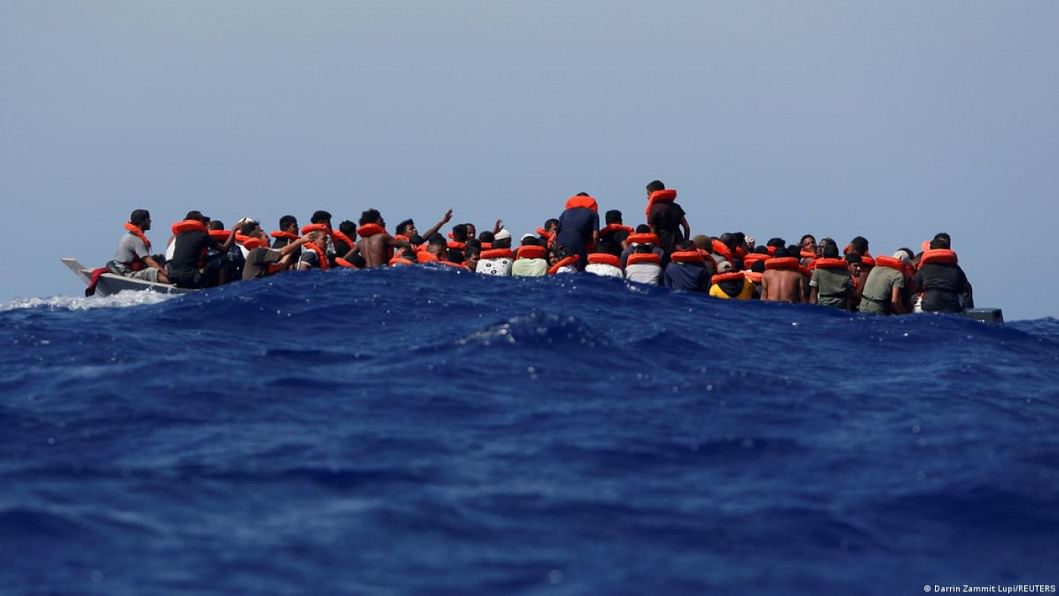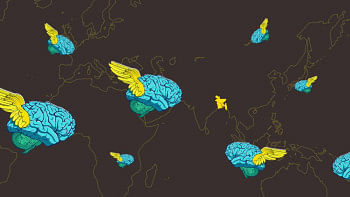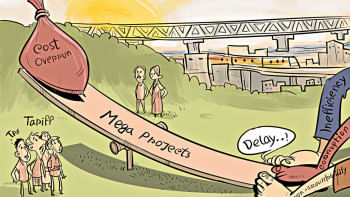Desperate migration of the youth amidst ‘development’

In the book "Uncertain Tomorrows: Livelihoods, Capital and Risk in Labour Migration from Bangladesh" (UPL, 2016), Syeda Rozana Rashid attempts to explore the causal links between lack of security in people's lives and livelihoods and overseas labour migration from Bangladesh. When Rozana Rashid was working on understanding the causes of migration of people from two migration-intensive villages in Cumilla, Bangladesh was being promoted as a country riding the tide of development.
The ethnographic study found that people are well aware of the risks involved in migration. But they also see opportunities to benefit from it – there are many more risks to rural life and livelihoods in Bangladesh that make migration seem less risky. Although agricultural land provides a form of security in rural life, agricultural work is no less risky than migration. In addition to the uncertainty of weather and natural disasters, there are various political risks, economic risks and uncertainties like not getting the right price for crops. While investigating the reasons for the migration of the working people, she noted at that time that Bangladesh as a state had not yet developed a political system that could guarantee economic stability and social security.
Almost a decade and a half has passed since. During this period, the GDP and per capita income increased significantly. But has the political and economic system been developed in a way that the working youth of this country can dream of a bright future? The growing incidents of desperate migration of Bangladeshi youth taking deadly risks while crossing the sea by boats, in the midst of the rhetoric of expensive infrastructure-based development, says otherwise.
According to the report titled "Migration from Bangladesh to Italy via Libya" by the United Nations International Organization for Migration (IOM), the number of Bangladeshi migrants going to Italy by boat using the dangerous route of the Mediterranean Sea through Libya is increasing day by day. In 2022, 15,228 migrants from Bangladesh arrived in Italy via the Central Mediterranean Route (CMR) with a majority transiting through Libya. Migrants from Bangladesh constituted slightly more than 14 percent of all arrivals in Italy – the third most-represented nationality. This number was 602 in 2019 (5 percent), 4,141 in 2020 (12 percent) and 7,838 in 2021 (12 percent).
After the Mediterranean route, Bangladeshis use the Balkan route the most. More than 6,000 Bangladeshis have gone to Europe through this route in the last few years. There have also been incidents of Bangladeshis being stuck in the forests of Bosnia while entering through this way.
The question is, why are increasing number of Bangladeshi youths desperate to migrate by risking their lives across the seas, jungles and deserts. If these young people would get good employment opportunities within the country, if they would get living wages, if their workplaces were safe, would they risk their lives to cross the seas, jungle and desert so desperately? To answer this question, we can look to the direct experience of some aspirant migrants reported in the media.
If there is no decent job opportunity within the country, young people will always strive to get it even if they need to risk their lives.
Jumon Ahmed of Shariatpur first went to Turkey by air via Dubai, then to Libya and then reached Italy via the dangerous Mediterranean Sea, according to a report by Bonik Barta. Before embarking on this risky journey, Jumon worked for three years in a Chinese restaurant in Mirpur, Dhaka. During this time no appointment letter was given to him. He had no fixed salary, rather was paid according to the whims of the owner. He told Bonik Barta that he could not change his job even if he wanted to just because he is not highly educated. That is why he decided to take this risk.
Arafat Rahman, an aspiring Bangladeshi migrant told InfoMigrants that he went to Serbia hoping to reach Italy after failing to get a job as a computer operator at a court in Bangladesh. He was asked to pay a bribe of 16,000 Euros to get the job that would pay him around 160 Euros per month as a salary. He decided not to take the job as the bribe was too high. He hoped to earn much more in Italy and pay back the loan that he took to go there.
Why did young Khokon Ahmed of Sylhet's Biswanath Upazila, who died on his way from Libya to Italy by boat in 2019, take this risk? According to a statement given by Khokon's brother Liton to Deutsche Welle, Khokon's father was a shopkeeper. All five of the brothers were unemployed. Among them, Khokon was a degree class student. Khokon's father agreed to send his son to Italy with the money collected by mortgaging the shop and borrowing Tk 8 lakh in anticipation of good employment opportunities in Italy.
There are more such stories. All human beings have the desire to live a decent life. No one wants to be stuck in a low-wage drudgery job forever. If there is no decent job opportunity within the country, young people will always strive to get it even if they need to risk their lives. According to a survey by the IOM on more than 11,000 potential migrants in 64 districts of Bangladesh, the majority of the respondents reported that they chose to migrate to find better job and livelihood opportunities (73 percent). Other common reasons were financial (13 percent) and to enhance their social status (11 percent). Not only that, 91 percent of potential migrants would consider staying in Bangladesh if there were more work opportunities, but 46 percent of them had conditions on that answer. Most of the conditions were related to better quality of work, including better salaries (63 percent) and better opportunities for work (33 percent). It is to be noted that, potential migrants planning to travel to Europe and the Americas or Asia and the Pacific were more likely to have completed a secondary school education or higher – 67 percent of potential migrants to Europe and the Americas and 51 percent of potential migrants to Asia and the Pacific.
It seems many of the moderately educated young people who have passed secondary school do not find any such employment in the country by which they can hope to live a decent life. As a result, many of them tried to reach Europe by crossing the sea, desert or the jungle despite knowing the risk. Even the workers who went to the Middle Eastern countries as migrants, after not being able to earn as expected despite their hard work, became desperate to go to Europe in the hope of a better income.
As long as quality employment, living wages and a safe working environment cannot be ensured for the youth within the country, the dangerous and desperate journey to Europe will not stop.
Kallol Mustafa is an engineer and writer who focuses on power, energy, environment and development economics.

 For all latest news, follow The Daily Star's Google News channel.
For all latest news, follow The Daily Star's Google News channel. 






Comments